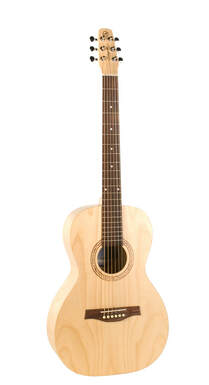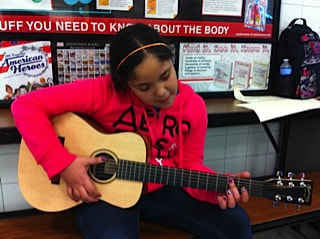 By Jennifer Hughes March 5, 2019 Acoustic guitars, no matter the size and shape, are affected by humidity and temperature. Whether it’s an inexpensive starter guitar, a mid-range acoustic guitar below $1500 or a high-end professional model, it can get damaged when subjected to low or high humidity and extreme changes in temperature. How Humidity and Temperature Affect Acoustic Guitars Humidity refers to the amount of water vapor or moisture in the air. A low humidity means the air is drier, while a high humidity means there’s a lot of moisture in the air. Relative humidity is the amount of moisture in your surroundings relative to the amount of moisture the air can hold before the saturation point is reached. As the temperature increases, so does the air’s ability to hold additional water.  Changes in relative humidity, along with changes in temperature, cause damage to an acoustic guitar. The wood on acoustic guitars reacts to humidity in the same way that other types of wood do. It swells when it’s too moist and it shrinks when it’s too dry. When a guitar is exposed to dry conditions for a long period of time, it loses its stored moisture and the wood shrinks. This may result in cracking, the frets protruding and the action getting low with lots of fret buzz. A too-dry acoustic guitar that has shrunk puts a lot of strain on the top, compromising the structural integrity, play-ability and sound of a guitar. If a guitar is exposed to excessive humidity, the seams may separate, the action may become unplayable and the bridge may come loose. These kinds of damage are why it’s important to make sure you store your guitar in a place with ideal levels of humidity.  How to Keep Your Acoustic Guitar in Good Playing Condition The ideal humidity range for all acoustic guitars is 45 to 55 percent. Here are some tips to follow to make sure you protect your guitar from the ravages of extreme humidity and temperature changes:
Final tip: If you are unsure of the extent of the humidity and temperature damage to your guitar and what you need to do to fix it, don’t hesitate to bring it to a guitar technician right away. There’s no quick fix or restoration process for acoustic guitars, so it’s best to leave the repairs to the pros.
11 Comments
11/25/2019 12:42:52 pm
It's helpful that you point out that moisture and heat can cause damage to the wood of a guitar. My acoustic guitar was recently damaged by being left in a room with a humidifier, and I want to get it professionally repaired. I'm going to look for someone who does professional guitar repair and restoration in my area.
Reply
4/1/2021 09:56:25 pm
I appreciated it when you shared that it is important to store your guitar in its case when you are not using it, especially if you live in an area with low humidity. My nephew just mentioned the other day that he is thinking of learning to play guitar since he has always wanted to become a musician. I think it would be great if I get him one for his birthday and make sure to keep it safely when it is not in use.
Reply
9/3/2021 04:30:08 am
Yamaha Acoustic Guitars For Beginners, a perfect combination of traditional, modern, warm balanced tone, inspired by Yamaha's 50 years of guitar crafting.<a href="https://dhruba.com/blog/guitar/how-to-tune-a-guitar/>a4 cut guitar</a>"
Reply
9/3/2021 04:39:57 am
Finer quality wood gives them an incomparable sound and lasts longer. Basically, acoustic guitars start from 3k to 4k, but the best beginners guitars fall ...
Reply
6/9/2023 06:20:41 am
Excellent! Thank you for this post. This is very helpful and resourceful article. Congrats and keep posting! You may visit also my website at
Reply
12/16/2023 01:25:18 am
Experience the ultimate pleasure with high-profile call girls available 24/7. Our attractive escorts agency ensures a delightful time with Russian Escorts Noida and VIP models in Noida. Call 9899869190 now!! Visit here for more information:-https://delhicallgirlservice.in/noida-escorts.html
Reply
Leave a Reply. |
BlogArchives
June 2024
Categories
All
|
Copyright © 2024 Guitars In The Classroom. All rights reserved.

 RSS Feed
RSS Feed